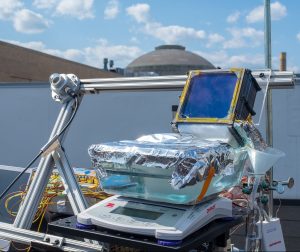Desalination by sunlight
A completely passive solar powered desalination system developed by researchers at MIT and in China could provide more than 1.5 gallons of fresh drinking water per hour for every square meter of solar collecting area. Such systems could potentially serve off-grid arid coastal areas to provide a low-cost water source.

The system uses multiple layers of flat solar evaporators and condensers, topped with transparent aerogel insulation. It then desalinates the water in stages, with each stage harnessing heat released by the previous stage–heat that would usually be wasted. In this way, the team’s demonstration device can achieve a world record efficiency level in converting the energy of sunlight into the energy needed to induce water evaporation.
The device is essentially a multi-layer solar still, with a series of evaporating and condensing components like those used to distill liquor. Its flat panels absorb heat and then transfer it to a layer of water, which begins to evaporate. The vapor then condenses on the next panel and gets collected, while the heat from the vapor condensation gets passed to the next layer.
The team used a 10-stage system for the proof-of-concept device, which was tested on an MIT building rooftop. The system delivered pure water that exceeded city drinking water standards, at a rate more than double that previously produced by any such passive solar-powered
desalination system, says Evelyn Wang ’00, professor of mechanical engineering and department head, who led the research.
The team, which included Lenan Zhang, SM ’18, and Lin Zhao, PhD ’19, estimates that a system to serve the needs of a family might be built for around $100.
Keep Reading
Most Popular
Large language models can do jaw-dropping things. But nobody knows exactly why.
And that's a problem. Figuring it out is one of the biggest scientific puzzles of our time and a crucial step towards controlling more powerful future models.
How scientists traced a mysterious covid case back to six toilets
When wastewater surveillance turns into a hunt for a single infected individual, the ethics get tricky.
The problem with plug-in hybrids? Their drivers.
Plug-in hybrids are often sold as a transition to EVs, but new data from Europe shows we’re still underestimating the emissions they produce.
Stay connected
Get the latest updates from
MIT Technology Review
Discover special offers, top stories, upcoming events, and more.